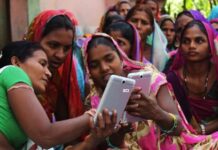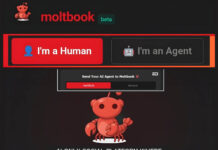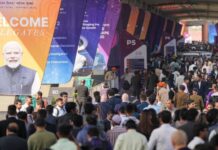America’s West Coast in the 60s was swept by a counter-culture of Eastern spirituality, music, drugs, and idealism. Rockstars collaborated with Buddhist and Hindu gurus. ISCON’s Srila Prabhupada could be seen singing with Janis Joplin and Grateful Dead. Jobs grew in the culture of LSD and spirituality.
Steve Jobs, a college dropout, ate free food at Hare Krishna Temple in Portland. He was saving money for his trip to India. His spiritual journey to India in 1974 led to the creation of a brand that owns the most unique electronic products.
Steve Jobs’ Visit To India
Jobs got his inspiration from the book by Richard Alpert, ‘Be Here Now.’ Richard Alpert was famous as Ram Dass in America and was a devotee of Neem Karoli Baba. Jobs set out for India in 1974 along with his friend and fellow dropout Dan Kottke. Kottke became the first employee of Apple in later years.
Michael Moritz, the author of Jobs’ biography, has written in his book, “The hot, uncomfortable summer made Jobs question many of the illusions he had nursed about India. He found India far poorer than he had imagined and was struck by the incongruity between the country’s condition and its airs of holiness.”
Later, Zuckerberg told Prime Minister Narendra Modi in one of his visits to Facebook headquarters in the US that Steve Jobs had suggested he visit the Ashram to find himself again and to reconnect with the mission of the company.
“Jobs told me that in order to reconnect with what I believed as the mission of the company, I should visit this temple that he had gone to in India early on in his evolution of thinking about what he wanted Apple and his vision of the future to be.”
Zuckerberg visited Kainchi Dham in 2008 and told the Prime Minister that the experience was helpful as he built Facebook.
Also Read: Why Have Things Suddenly Gone Sour Between Apple And Elon Musk’s Twitter?
Jobs And Neem Karoli Baba
Neem Karoli Baba was a mystic saint considered to be an incarnation of Lord Hanuman by his devotees. His ashram Kainchi Dham is located in Bhawali, near Nainital.
He attracted a large number of Western celebrities like Jeff Skoll of eBay, Julia Roberts, and Larry Page of Google. He was popularized by Richard Alpert in his book. Baba never propounded any philosophy. He was only driven by a message to serve others.
When Steve Jobs reached India, Baba had passed away a year ago. India was not what Jobs imagined through his drugged hallucinatory visions. Jobs was disillusioned, but something more than that happened.
Walter Isaacson, in his biography of Jobs, writes, “Years later, sitting in his Palo Alto garden, he reflected on the lasting influence of his trip to India: “Coming back to America was, for me, much more of a cultural shock than going to India.
The people in the Indian countryside don’t use their intellect as we do, they use their intuition instead, and their intuition is far more developed than in the rest of the world. Intuition is a very powerful thing, more powerful than intellect, in my opinion.
That’s had a big impact on my work. In the villages of India, they never learned it. They learned something else, which is in some ways just as valuable but in other ways is not. That’s the power of intuition and experiential wisdom.”
A few years after Jobs’ India trip, the realization of the importance of intuition led to the birth of Apple, which owns some of the most intuitive gadgets.
Jobs And Paramhansa Yogananda
During his visit to India, Jobs got the importance of intuition. Along with it, he got to read ‘Autobiography of a Yogi’ by Paramhansa Yogananda. This book had been a bestseller since it was first published in 1946.
Jobs, during his Ashram visit, rented a room for himself where he found this book left by a former traveller. He was so influenced by the book that the message stayed with him till he died. A few months before his death, this book was the only book he had on his iPad.
Jobs knew that he was about to die, and he had planned his memorial service himself. Marc Benioff, the co-founder, and CEO of the software company, spoke of the secret gift Jobs had left for people who would attend his memorial service.
All those who attended Jobs’ service were given a copy of ‘Autobiography of a Yogi.’ Benioff said, “He went to India, and he had this incredible realization that his intuition was his greatest gift and that he needed to look at the world from the inside out.”
Apple has fully arrived in India. After the beginning of production of iPhones, the company opened its first retail store at the Jio World Drive mall at BKC in Mumbai, whereas the second one at the Select Citywalk mall in Saket, in New Delhi. With the opening of the first retail store in the country of its spiritual origin, Apple has come a long way.
Image Credits: Google Images
Sources: Economic Times
Find the blogger: Katyayani Joshi
This post is tagged under: spirituality, Nainital, India, apple, iPhone, intuition, gurus, moksha, knowledge, post-pandemic, kathas, Hanuman, sermons, bhajans, popularity, relevance, Mumbai, New Delhi, Ashram, Paramhans Yogananda, Neem Karouli Baba, poverty, Autobiography of a Yogi
Disclaimer: We do not hold any right, or copyright over any of the images used, these have been taken from Google. In case of credits or removal, the owner may kindly mail us.
Other Recommendations:
Insta Influencer Devis-Gurus Are Leading The Spiritual Market And How





































[…] Read More: What’s Common Between Steve Jobs, Mark Zuckerberg, And India? […]
[…] Read More: What’s Common Between Steve Jobs, Mark Zuckerberg, And India? […]